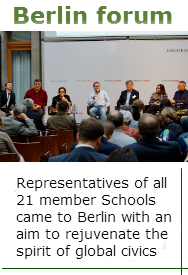FACT SHEET
Summer University for Democracy
2-6 July 2007
Key points
· The Schools of Political Studies, supported by the Council of Europe, aim to train the next generation of political, economic and cultural leaders. They are established in countries that have recently moved towards democracy. There are currently 15 schools in South-East Europe, the Caucasus and Russia providing training for young politicians, journalists, lawyers, and business managers.
· The Schools of Political Studies are flexible “schools without walls”. It is not an academic study course, but a series of seminars that culminate in a major event, the Summer University for Democracy at the Council of Europe’s headquarters in Strasbourg. This year, it will take place from 2 to 6 July and bring together 600 participants.
· At the Council of Europe 3rd Summit in Warsaw on 16 and 17 May 2005, the Heads of State and Government of 46 member states acknowledged the role that the Schools of Political Studies play in strengthening democracy in Europe.
Summary
In the aftermath of political changes, war and conflicts, democracies in transition need to train a new generation of decision-makers committed to European values. These future leaders should act in the interest of tolerance, human rights and the rule of law. A network of political schools provides them with practical training and develops a spirit of cooperation.
The Council of Europe Schools of Political Studies provide training in democratic practice to young politicians, lawyers, journalists and businesspersons, who would like to extent their knowledge and experience. The first Council of Europe-backed school of political studies was founded in Moscow in 1992. At present, such schools are operating in 15 countries of South-East Europe, the Caucasus and Russia.
The Schools of Political Studies are national NGOs in their respective countries. Each school is run by a director appointed by a board. About 40 candidates are selected every year, prepares study programmes and deals with financial and administrative management. The schools’ directors meet several times a year to co-ordinate their activities and exchange experiences and good practices. Alumni associations have been set up in participating countries, helping to maintain professional and social ties.
The candidates are offered a series of one-week seminars in their native country or abroad, with closing seminars at the Council of Europe in Strasbourg. At the end of the series, participants receive a diploma from the Council of Europe Secretary General and the School’s initiator (Director). Since their foundation, each of the schools has participated in an annual closing seminar in Strasbourg where the participants were offered an opportunity to familiarise themselves with the European institutions.
In 2006, in order to increase the visibility of the programme and forge stronger ties between participants from various countries, the closing seminars were merged into a single grand event – the Summer University for Democracy, which took place from 10 to 14 July and brought together 500 participants.
This year, more than 600 young people will gather in Strasbourg from 2-6 July for the second Summer University for Democracy. The five-day event will take a form of a series of lectures and workshops given by famous personalities, including George Soros, Boris Tadic, Olivier Dulic and Alexandre Milinkevich.. A final declaration will be adopted during the closing ceremony.
Q&A
1. Who provides financial support for the schools?
The project of the Schools of Political Studies is a joint programme between the Council of Europe and the European Commission. In addition to a basic financial contribution from the Council of Europe, the schools of political studies are financed by contributions from member and/or observer States, the European Union and international foundations and NGOs.
2. Where are these schools established?
At present 15 schools are operating in Russia, Ukraine, Georgia, Armenia, Moldova, Romania, Bulgaria, Serbia, Kosovo/UNMIK, "the former Yugoslav Republic of Macedonia" and Croatia. Schools in Albania, Azerbaijan, and Bosnia and Herzegovina have recently been established. A project to create a school in Belarus is under development.
3. Who studies in these schools?
Participants in the Schools of Political Studies include young political leaders (MPs, members of regional and local bodies, on average below 35 years of age), judges, lawyers, journalists, businesspersons and civil activists who are already involved in public affairs and would like to extend their knowledge and experience.
Among the schools’ alumni is Serguei Stanishev, current Prime Minister of Bulgaria, many ministers and their deputies, heads of major administrations, parliamentary committee chairpersons and members of the Council of Europe’s Parliamentary Assembly.
4. What role does the Council of Europe play in this project?
The Council of Europe provides the Schools with a European and political dimension. The political support granted by the Council of Europe to the schools’ activities is a source of credibility and viability for the NGOs involved and their partners. It also gives advice on the curriculum and the recruitment of tutors and lecturers.
5. Who runs the Schools’ study programme?
The Schools' study programme is piloted by the Directorate General of Democracy and Political Affairs, which encourages cooperation between the schools and the Council of Europe's activities in the countries involved in the programme.
6. What topics will be discussed at the Summer University 2007?
In 2006, the main item on the agenda of the Summer University was “Challenges to democracy in today’s Europe”. The Summer University 2007 is dedicated to “Projects for Europe”. The emphasis will be on such themes as “Identity, nationality and citizenship in democratic society”, “European strategies and national policies” and “Building a democratic culture”.
Contact
For more information contact Henriette Girard, Press officer,
Tel. + 33 (0)3 88 41 21 41; Mob. +33 (0) 6 08 46 01 57; Henriette.Girard@coe.int








